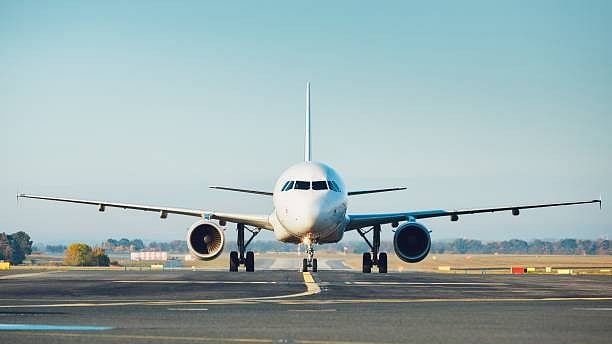
Representative image showing airplane taxiing to the runway.
Credit: iStock photo
New Delhi: A Parliamentary panel on Wednesday suggested a time-bound plan to grant administrative as well as financial autonomy to DGCA and flagged that the staffing crisis at the regulator is an "existential threat to the integrity of India's aviation safety system".
Besides, the committee said the current imbalance, where aircraft induction is outpacing airport growth, is putting unsustainable pressure on existing facilities, degrading service quality, and dangerously straining safety margins, as it pitched for developing a comprehensive National Capacity Alignment Plan to synchronise airport infrastructure development with airline fleet induction schedules.
The Department-Related Parliamentary Standing Committee on Transport, Tourism and Culture -- headed by Rajya Sabha member and JD(U) leader Sanjay Kumar Jha -- submitted its report on the 'Overall Review of Safety in the Civil Aviation Sector' on Wednesday.
One of the recommendations is to establish a time-bound mechanism for the closure of all safety deficiencies, with priority for serious Level I matters and implementing stronger enforcement actions, including financial penalties for non-compliance.
"This is a response to the significant and growing backlog of unresolved safety findings, which indicates a critical weakness in the post-surveillance rectification process that undermines the entire oversight programme. Concerns also exist about audit quality due to a lack of qualified DGCA staff and airlines prioritising profiteering over immediate maintenance," the report said.
The report has not mentioned the Air India plane crash that killed 260 people on June 12.
Calling for a time-bound plan to grant the Directorate General of Civil Aviation (DGCA) full administrative and financial autonomy, the committee said it is necessary to address critical technical staff shortages caused by "an ineffective recruitment model", a problem highlighted by past expert committees but never resolved.
Nearly 50 per cent of the 1,063 sanctioned posts at the regulator are vacant. Of the total posts, only 553 are filled.
"This deficit is not a mere administrative statistic; it is a critical vulnerability that exists at the very heart of India's safety oversight system, occurring precisely at a time when the sector's unprecedented growth demands more, not less, regulatory vigilance and capacity," the panel said, adding that the staffing crisis is not merely an administrative problem but an existential threat to the integrity of India's aviation safety system.
According to the report, the civil aviation ministry's current stance is that direct recruitment by DGCA is not under consideration.
Among the raft of suggestions, the panel also proposed mandating a detailed root-cause analysis for every runway incursion and other recurring high-risk events, and establishing focused remedial programs for these areas.
"This is necessary because key safety targets for events like runway incursions are consistently being exceeded, indicating that the current incident review process is failing to translate lessons learned into effective operational changes.
"Specific data on bird strikes and engine failures underscores the need for effective remedial measures despite existing systematic oversight," it said in the report.
Against the backdrop of recent helicopter crashes, the panel has recommended a uniform national regulatory framework for all state-operated helicopter services and mandatory, terrain-specific pilot training.
"This is prompted by a series of accidents in high-risk environments managed by state-level agencies with limited central oversight, revealing a regulatory ambiguity that creates unacceptable safety gaps. While the ministry defines central and state roles and DGCA has issued a circular for pilgrimage operations, the committee highlights the need for more proactive and uniform central oversight," it noted.
Among other recommendations, the committee has emphasised the need for having a 'just culture' and a legally-backed whistleblower protection framework.
This is to counter a punitive culture that deters the open reporting of errors, which is essential for proactive safety management. While DGCA has a confidential and non-punitive voluntary safety reporting system, there is a need for clearer protections, it added.